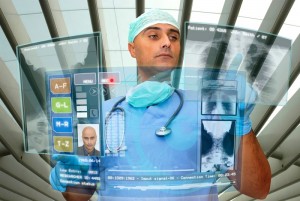Goal of unique collaboration is to give physicians a more accurate way to diagnose and treat many types of cancer
Two noteworthy healthcare organizations will collaborate with IBM (NYSE: IBM) to explore how IBM’s Watson can be used to help physicians deliver improved outcomes to patients. The collaboration involves one major health insurer and a prominent academic medical center in Los Angeles.
WellPoint, Inc. (NYSE: WLP) will interact with oncology experts at the Cedars-Sinai Cancer Institute in Los Angeles to “educate” and program Watson as a physician’s assistant. What makes this particularly interesting for anatomic pathologists is the potential of this project to marry advances in molecular diagnostics with artificial intelligence in ways that allow physicians to diagnose different cancers earlier and with greater accuracy.
In its story about this development, the Los Angeles Times reported that, per IBM, physicians at Cedars-Sinai Medical Center’s Samuel Oschin Comprehensive Cancer Institute will be the first to use the Watson technology.
The institute’s doctors will serve as advisers and lend expertise to help shape the initiative to develop effective ways to use Watson. “Cedars Sinai will provide the guidelines and insights to put into Watson,” stated Manoj Saxena, General Manager of IBM Watson Solutions, in a story published by Forbes Magazine.
Watson is IBM’s computing system that incorporates deep question answering technology that allows it to search quickly through vast amounts of data, then process it and analyze it in a way similar to that of the human brain. The Watson system is capable of processing the equivalent of about 200 million pages of data in about three seconds, Forbes reported.
First Commercial Application of Watson Technology Focuses on Cancer
The Cedars-Sinai collaboration marks the first commercial application of the Watson technology since it wowed the world by beating out the top two human champions on “Jeopardy!” last year. (See Dark Daily, “After Taking on Jeopardy Contestants, IBM’s Watson Super Computer Might Be a Resource for Pathologists”.)
It was late last year when IBM and WellPoint announced an agreement to work together to create the first commercial applications on the supercomputer. According to an IBM press release, WellPoint, the second largest U.S. health insurer (by enrolled beneficiaries) would develop and launch Watson-based solutions, while IBM would develop the base Watson healthcare technology on which these solutions would run.

Pioneering work will done by the three-party collaboration involving IBM’s Watson, WellPoint, and the Los Angeles-based Cedars-Sinai Cancer Institute. The target is to improve the way cancers are diagnosed and treated. (Photo by BigThink.com.)
WellPoint and IBM agreed that targeting oncology made sense, the Forbes writer suggested. “Oncology is a very complex field,” declared Harlan Levine, M.D., Executive Vice President for Comprehensive Health Solutions at WellPoint, in the Forbes story. “The amount of information in medicine in general doubles every five years. In oncology the amount of new information emerging is particularly prolific. It’s a hard area in which to keep up to date.”
“With real life experience observing how cancer progresses over time, [Watson] can see not just what the literature recommends, but the progression of the conditions so it can offer the most support possible to the clinician,” Saxena added. “We are in a partnership with clinical experts to help us teach Watson not only content but how to think like a clinician, how to assimilate data the way a clinician should in practice.”
As treatment of cancer evolves from surgery, radiation and chemotherapy to gene-based therapies, Levine noted, computer assisted decision making will become even more critical. “As we learn more genetic information and more about diagnostics and therapeutics tied to individual genetic profiles, the amount of information is mushrooming. Supercomputing power like Watson can bring all the data collected into the physician’s office.”
Expanding Access to Cutting-Edge Knowledge
Keeping up with exponentially increasing data is a growing challenge for physicians. According to Saxena, in an IBM survey of physicians, 81% revealed they spend less than five hours monthly reading medical journals. “It is humanly impossible to get all the research, impossible to take all that information and apply it at the time of diagnosis,” he stated in the Forbes story. “We have heard that approximately one in five diagnoses in the U.S. is inaccurate or incomplete.”
“The opportunity to use supercomputing powers to bring in vast amounts of data and make it understandable to the practicing physicians and do it consistently, accurately and quickly offers a tremendous opportunity to improve the status quo,” Levine emphasized. “Watson empowers the doctor with the collective knowledge of the oncology community.” Levine further noted the ability of Watson’s artificial intelligence capabilities to expand the reach of cutting-edge knowledge beyond academic centers and into regional medical centers and community hospitals.
Clinical laboratory managers and pathologists attending the 2012 Executive War College on Laboratory and Pathology Management earlier this month in New Orleans had the opportunity to hear first-hand the latest on the impact of the Watson technology on laboratory medicine. From IBM, Life Sciences Executive Loren Buhle Jr. Ph. D., addressed the general session on “The Potential of IBM’s Watson to Improve Diagnostic Accuracy Through Unstructured Data Analysis.”
The theme of unstructured data analysis was particularly appropriate, since much of the data generated from anatomic pathology testing is reported as unstructured data. Buhle demonstrated how Watson is designed to draw upon different sources of patient data and healthcare information to identify the most relevant diagnoses and assign a confidence level to each as a way to guide the physician toward an appropriate diagnosis.
—Pamela Scherer McLeod
Related Information:
2012 Executive War College Conference on Laboratory & Pathology Management, May 1-3, in New Orleans
IBM’s Watson computer to help doctors at Cedars


